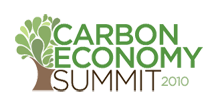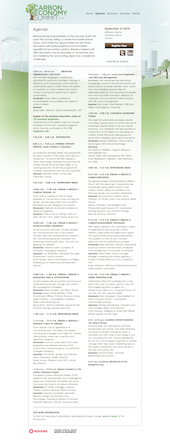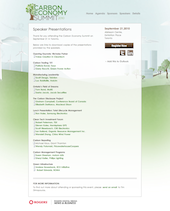 At the summit in Toronto that drew senior executives from Canada and around the world, one common thread emerged: Capital favours sustainable businesses. Deutsche Bank have more confidence investing in companies that disclose their greenhouse gas emissions. Investors see climate change issues as material to their investment decisions. Accountants see environmental information as an integral part of a company’s full performance picture.
At the summit in Toronto that drew senior executives from Canada and around the world, one common thread emerged: Capital favours sustainable businesses. Deutsche Bank have more confidence investing in companies that disclose their greenhouse gas emissions. Investors see climate change issues as material to their investment decisions. Accountants see environmental information as an integral part of a company’s full performance picture.
Carbon Economy Summit 2010 took place at Allstream Centre in Toronto on September 21. The one-day summit attracted major players from Canada and around the world. Among the international speakers were senior executives from China Wind Power, UPS, Deutsche Bank, and Grant Thornton. Speakers from Canada included Toronto Stock Exchange, TSX Venture Exchange, Conference Board of Canada, KPMG, PricewaterhouseCoopers, Samsung, Philips, Cisco, Rogers, Torys, and MaRS.
The opening keynote by Nicholas Parker, founder of Cleantech Group, set the tone. Parker said going green has become more than a moral issue, it is now a business profitability issue. Recent studies from McKinsey and Ernst & Young showed most corporate executives see managing carbon effectively as a way to improve profitability and adopting clean energies can reboot earnings after the current recession. One area Parker suggested Canada could lead is in solar technology in cool climates, much like how Singapore leads solar in hot climates.
One common thread emerged through the eight sessions I attended and conversations I had with the speakers: climate change has become a component of finance and capital favours sustainable businesses. Deutsche Bank, Grant Thornton, Conference Board of Canada, and Macleod Dixon spoke in their individual sessions all converged to this point. Businesses who want to attract financing from banks and investment from institutional investors and stock markets need to demonstrate they have their climate change issues under control.
Bruce Kahn, Senior Investment Analyst for Deutsche Bank in New York, spoke on how they take climate change factors into consideration when choosing companies to invest in. Their asset management team includes environmental, social, and governance (ESG) specialists to assess how a company deals with matters such as energy efficiencies and supplier sourcing. Going green often increases the net present value and makes more money. The markets and the large institutional investors like pension funds care about these factors. Over $25 trillion are currently part of the Principles for Responsible Investment. Clean tech represents big investment opportunities. But the risks must be evaluated.
When asked about how Deutsche Bank do their analysis, Kahn said they would begin by evaluating a sector as a whole. ‘For instance, how would the wind manufacturing sector or the solar manufacturing sector benefit from the Ontario Feed-In Tariff program? After that, we drill further into each company and evaluate how they are positioning themselves. How well is Samsung positioning themselves for Ontario FIT? That would be an important consideration for us if Deutsche Bank was considering an investment in Samsung.’
ESG evaluation data from third parties, such as RiskMetrics, are also used. ‘Our analysts would look at these data, but there is no specific formula that we follow. We don’t drive the data into the balance sheet. It’s more qualitative and subjective. The subjectivity is important for the market. Most data are commodities available to everyone. The difference is in how each of us make subjective judgment using those data.’
What should businesses do to attract investments? Kahn would like to see companies report better on energy consumption, water consumption, toxic inventories, and especially their CO2 emissions. ‘These disclosures could show us the company is having these issues sorted out. This will help the market feel more comfortable about investing in them.’
Speaking on similar issues but from the regulatory disclosure point of view was Elisabeth DeMarco, a partner from the multinational law firm Macleod Dixon. DeMarco noticed a clear trend that Canadian investors are increasingly concerned with climate change issues. Just a few years ago, shareholder resolutions on climate change were very rare. But in 2009, 10% of Canadian shareholder resolutions were related to climate change, and support for those resolutions can be up to 80%. Most were requesting further disclosure on what management is doing about climate change, what the risks are, and how management is handling it. This is an indicator that the so-called ‘reasonable investor’ of today view climate change matters as material. (For more on this topic, see Investors Increasingly Concerned With Climate Change Risks.)
DeMarco anticipates that by the end of 2010, the Ontario Securities Commission will release further guidance on disclosure by public companies related to climate change matters. The OSC is currently working with a panel on addressing these deficiencies.
Michael Krzus, a partner at Grant Thornton in New York, reinforced these views from an accountant’s point of view. While more and more companies issue corporate social responsibility reports, Krzus argued that CSR information has become so important that it should be integrated into the traditional company report.
Krzus who co-authored the book One Report: Integrated Reporting for a Sustainable Strategy (Amazon.ca) with Harvard professor Robert Eccles advocates an integrated reporting format that can provide greater context for performance data and clarify how sustainability fits into operations of a business. European companies such as BASF and Phillips use the integrated reporting format. In Canada, Vancity, BC Hydro, and CIBC use integrated reporting and are seen as leaders in this regard.
Canadian businesses should take note of this common thread. How your business deals with sustainability issues affect more than the future of the environment. It also affects how your bank looks at you, how your institutional investors look at you, and how your shareholders look at you. Increasingly they want to invest in sustainability leaders because those will likely be the profitability leaders.
Summit agenda and speaker presentations:
![]()


